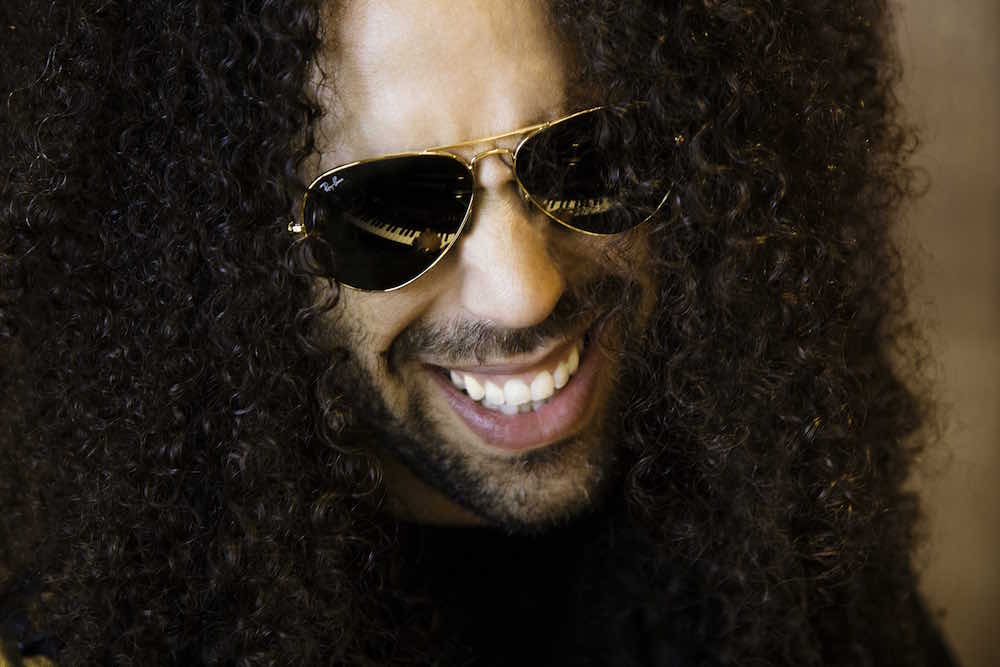Swing Time: Cameron Graves

Cameron Graves knew exactly where he wanted to go on his second album. Following his 2017 debut as a bandleader, Planetary Prince, and his work with the hyper-talented LA-based collective the West Coast Get Down—most notably on saxophonist Kamasi Washington’s groundbreaking 2015 triple album, The Epic—the keyboardist was ready to introduce another side.
“I live in jazz, but I also live in metal,” he says. “I wanted to develop a record that’s got the same intensity as a metal record, but with me on piano.”
Seven, released on Artistry Music/Mack Avenue Music Group in February, rages relentlessly. It’s not that jazz and heavy metal have never met before, but rarely have the two genres come together so seamlessly and with such potency. The set’s 11 songs are mostly ferocious—a tsunami that rivals the most uncompromisingly brutal hardcore of the punk era, while simultaneously recalling the dexterity of classic ‘70s fusion of bands like Weather Report, Return to Forever and the Mahavishnu Orchestra.
“I wanted to bring that back, but in a different way,” Graves says. “It’s not as spacey as the RTF stuff—that compositional style. I wanted to have it where we’re all playing the same lines. That’s where the power of the music comes in. I wanted it to be a direct shot, instead of floating.”
Floating is a good word to describe the feel of Planetary Prince. For that collection, Graves and his collaborators explored a panoply of sounds and navigated several hairpin rhythmic shifts. Yet, they also often launched into unexpected, uncharted prog[1]jazz territory and made sure to leave plenty of open space.
Comparatively, Seven is an unyielding, impenetrable, flying brick wall, albeit just as tricky in its employment of split-second changes and its over-the-top demonstrations of technique. There’s a uniformity to the band’s attack, and the musicians’ virtuosity comes shining through, even as they avoid both standard jazz changes and metal bombast. The record label’s press hype calls it thrash-jazz, and that tag sums it up just about perfectly.
Just how Graves was able to accomplish that level of savagery with a piano-led quartet is where his training and vision come together. He went into the project with definite goals. “I purposely wanted to use the acoustic piano on this,” he says. “I wanted to bring acoustic piano out of the jazz idiom—or what people consider to be jazz piano—and put it into more of a metal idiom. And the funny thing about it is that it still doesn’t sound like death metal. It just sounds like orchestrated heavy music.”
That, perhaps, shouldn’t come as a surprise either because Graves’ roots include years of classical music education. “Classical is my base,” he says. “I have a brother, Taylor Graves, who is also a piano player, writer and producer. We’ve been doing some movie scores.”
Although Graves’ associations with Kamasi Washington and the other members of his crew go back to their high-school days in LA, for Seven he wanted to start fresh so he teamed up with three players he had never recorded with: guitarist Colin Cook, bassist Max Gerl and drummer Mike Mitchell. “[Colin is] a complete shredder. It was a blessing to find these three guys,” Graves says. “They are the guys.”
With the lineup in place, Graves drew on his experiences working with Washington and their ensemble, which has expanded over the years from a bunch of high-school pals jamming into a 10-piece, internationally renowned juggernaut playing major venues. “We knew that we had something powerful, and we knew that we had some of the best musicians in the city,” Graves says about the Get Down troupe. “We built it up from packing out this random bar in Hollywood, the Piano Bar—the fire department had to shut it down a few times— to where we could take it on the road. At that point, we were like, ‘Wow, this is definitely insane.’”
Graves also put in significant time touring with the great bassist Stanley Clarke, a core member of Return to Forever. “That was an education, like going to the school of Stanley Clarke,” he says. “He taught me everything, really in-depth. And he purposely wanted me to be all [Fender Rhodes electric] keyboard on his gig. There was another piano player, and he wanted me to stretch out my mind on the keyboard. I had to figure out, ‘OK, where’s my sound around that piano player?’”
By the time he was ready to start work on Seven, Graves had logged enough experience, and built enough confidence, to make the big shift. As he had with Planetary Prince, he drew further inspiration from The Urantia Book, a 2,000-plus-page tome—author unknown—that originated sometime in the early 20th century. First published in 1955, it encompasses theology, astronomy, astrology and martial arts. To an outsider— with its talk of superuniverses, high-level spirits, sub-infinite beings and much more—The Urantia Book might seem an opaque, spacey alternative to the Bible. But, to Graves, it’s a vital component of who he is and what he does.
“It’s really inspired me,” he says of the massive volume, “I wanted to bring this book to people through the music. That’s where all the song titles come from and where Seven comes from. [The number] seven is considered the perfect division in the universe because of the seven different personalities that are born out of the Trinity.” He goes on to explain things a bit more, obviously pumped up, before summing it all up in a more prosaic way: “It’s all just really cool.”



















